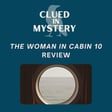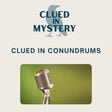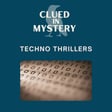Become a Creator today!Start creating today - Share your story with the world!
Start for free
00:00:00
00:00:01

Magic and Mysteries (part 1)
Mysteries set in magical worlds or with mystical elements are popular and in today's episode, Brook and Sarah discuss why.
Discussed
The Prestige (1995) Christopher Priest
The Rivers of London (2011) Ben Aaronovitch
"The Eyes Have It" (1964) Randall Garrett
The Life of Crime (2022) Martin Edwards
The Magician's Secret (2015) Carolyn Keene
Now You See Me (2013) Summit Entertainment/Lionsgate Films
Clayton Rawson
Jonathan Creek (1997-2016) BBC
The Librarian of Crooked Lane (2022) C.J. Archer
Magic, Inc. (1940) Robert A. Heinlein
Murder in Devil's Cove (2020) Melissa Bourbon
For more information
Instagram: @cluedinmystery
Contact us: hello@cluedinmystery.com
Music: Signs To Nowhere by Shane Ivers – www.silvermansound.com
Transcript
Transcript
Introduction to Hosts and Theme
00:00:11
Speaker
Welcome to Clued in Mystery. I'm Sarah. And I'm Brooke. And we both love mystery. Hi Brooke. Hi Sarah. How are you today? I'm great. Thank you. How about you? Yeah, I'm great too. And I'm really looking forward to this conversation today.
Exploring Magical Mysteries
00:00:28
Speaker
Yeah, so we're going to talk about magic and mysteries. And when I say that Brooke, what kind of book pops into your mind? Is it a cozy mystery featuring witches or talking animals? Do you think about a book where the sleuth uses magic in the investigation? Or do you think of mysteries featuring stage magic?
00:00:48
Speaker
Broadly, I would consider all of these to be magical mysteries. And like so many mystery subgenres that we've already spoken about, there's a real spectrum, both in the type of magic, the mystery itself, or the type of mystery, and also, I think, the popularity. If you look on Amazon, which in wizard mysteries have their own category, which suggests to me that they're quite popular. But judging by the covers, they're mostly cozy mysteries.
00:01:17
Speaker
but not all mysteries with magic are lighter. There are also PIs, historical mystery, alternative history featuring magic, and I hope we get a chance to talk about each of those
Magic in Literature: Historical Perspectives
00:01:28
Speaker
today.
00:01:28
Speaker
In terms of the history of the subgenre, I'm not sure that we would be classifying this as a mystery necessarily, but Shakespeare's Macbeth opens with witches and does feature murder. Through much of history, witches were evil and scary and were code for women who were different. Fairy tales feature good and bad witches, though most of them are bad.
00:01:47
Speaker
Al Frank Baum's The Wizard of Oz, published in 1900, also features good and bad witches. Looking at the history of mystery and magic, in the Golden Age of mystery, there were several examples of mysteries featuring stage magic. Since then, other mysteries featuring magic have been popular. When Shakespeare was writing his plays, I'm sure that his audiences would never have dreamt that witches were the heroic crime solvers in today's cozy mysteries.
Magical Elements in 'The Prestige'
00:02:14
Speaker
So Brooke, what type of mysteries featuring magic have you read? I think that the majority of the ones that I have read and certainly the ones that I revisited or read to get ready for our conversation today are more on the stage magic end of things. I really like those characters, especially if you look at some of the historical mysteries along those lines.
00:02:38
Speaker
Um, one of the first things that came to my mind when we talked about, uh, reviewing this sub genre Sarah was the prestige. And, um, that's a movie that I really enjoyed. I think it's 2007, 2006 somewhere around that era. And I saw it, you know, really early when it first came out and I just loved it. And I thought, well, this was a perfect opportunity.
00:02:59
Speaker
to revisit that and read the book. So I have started it, I haven't completed it, but it's written really well. And it's telling the story of these two rival stage magicians. And it's told as I know you and I both love, an epistolary novel with these old journals from the two rival magicians.
00:03:19
Speaker
But I will say that I was surprised because when I picked it up, I'm thinking that it's a psychological thriller. That's kind of how I would code that movie. But it's actually classified as fantasy. And I'm thinking that that's probably because there is an element of actual conjuring without giving too much away.
Urban Fantasy Mysteries Discussion
00:03:41
Speaker
And so I'm going to say it's a fantastical thriller.
00:03:44
Speaker
Well and so that's a good point because I think a lot of the mysteries that kind of fall under the magic umbrella really there's a big overlap with fantasy and some are urban fantasy so you know magic is just there's magic but there's also other supernatural creatures
00:04:07
Speaker
And I think we could probably do a whole other episode talking about kind of that paranormal mystery that features less of the magic and more of those other creatures. But an example of that kind of urban fantasy would be Ben Aranovich's Peter Grant series. So this is a police procedural. Grant has just finished his probation with London's Metropolitan Police.
00:04:37
Speaker
And he actually becomes an apprentice wizard after he joins a small unit that deals with crimes that have supernatural elements. And so the world is recognizable as ours.
00:04:53
Speaker
everything with the exception of these supernatural creatures and the magical elements we would see as being London. But yeah, there's magic, there's ghosts, and there are this whole cast of other creatures that are part of this world.
00:05:11
Speaker
So I'm really, I haven't finished the first book yet, but I'm really, really enjoying it. And there's several in this series. And I think also some graphic novels as well, which is something again, that suggests to me that kind of overlap with fantasy, because we don't see a lot of that supplementary material in kind of what we would consider the mystery genre.
00:05:38
Speaker
Yeah, that's a really good point and a good way to think of it is that overlap with fantasy because there has to be right because we're talking about things that are imaginary and not in the real world. But that sounds like a great series. I love it when we can have the magical world overlaid on the real life world because I love the feeling of realism that that gives it even though we know that it is just fiction.
00:06:06
Speaker
And that actually brings up a fun quote that I took from the Prestige. And so this is from the journal of Alfred Borden, who, if you'll recall in the movies, played by Christian Bale. And it says, the Prestigitator, who is the magician,
00:06:25
Speaker
and the audience enter into what I term the pact of acquiescent sorcery. And I just loved that because it brings up the fact that in any of these books and even in those fantasy novels, as readers, we're entering into a pact with that author to be like, okay, we're going to suspend our disbelief and we're going to
00:06:49
Speaker
You know jump in and enjoy this world this fictional world with these creatures that don't necessarily Exist in the real world and just have fun with it. And you know, that's kind of what we do at a magic show, too
00:07:03
Speaker
Yeah, no, you're totally right about kind of entering this disagreement with the author that there are going to be some rules around the world that they've created. And you might not get an explanation of how everything in the world works, but you're expecting for it to behave. Once it's behaved one way, you're expecting it to continue to behave that way, right?
00:07:33
Speaker
So yeah, I think that's really a good point. To prepare for our conversation, I did read a few books and short stories that I probably wouldn't have ordinarily picked up.
Stage Magicians in Mystery Fiction
00:07:45
Speaker
I read the short story, The Eyes Have It by Randall Garrett.
00:07:50
Speaker
And so I discovered him, actually, he's mentioned in Martin Edwards' book, The Life of Crime. And Garrett's detective is Lord Darcy, who is an investigator for the Duke of Normandy. And this is an alternate history. So there's two kind of things that are happening in this book. It's an alternate history where
00:08:12
Speaker
It's set in the 1960s, but the world is very futile because Richard the Lionheart didn't die in 1199 as he did in our world. So my English history doesn't go back much further than say the War of the Roses, which is about 15th century.
00:08:30
Speaker
So there were probably some pieces that I didn't really get. But in addition to this being an alternate history, magic has been standardized in this world for hundreds of years. And so, you know, it's just part of the way that they that they live. And I actually struggled a little bit to
00:08:56
Speaker
follow everything because there were two elements that were so different from the world that we live in. So, Aaronovich's book in the Peter Grant series, The Rivers of London, it was much easier for me to get into that because I recognized the rest of the world, right? But I think when you've got two things that are different, for me at least, it was a little bit more challenging.
00:09:25
Speaker
Yeah, I agree. Both of those are really fun concepts. The alternate history where this great leader didn't die, and of course it's a sliding door moment where everything changes. I love that, but I can see how it would be hard to almost keep track of both of those different settings, basically.
00:09:45
Speaker
Yeah, you know, as I was reading it, I was I was almost thinking, you know, like I would love to read historical fiction set in Tudor times, which I've read a lot more of. And I would probably I would know the characters and like understand the history a little bit more.
00:10:03
Speaker
but where magic was a part of that world. I think that would be really great. And if you had some mystery in there too, I think I would love that. But I think it was having it set in 1960. And so there were things that you might recognize from present day or recent history, but then also this very feudal societal structure. Yeah, it was just a little bit too much for me.
00:10:33
Speaker
And I think that that also harkens back to the fact that we are primarily mystery genre readers because a fantasy reader, they do that kind of mind bending stuff all the time in their books. So that might not have been so difficult for somebody who primarily reads a fantasy.
00:10:52
Speaker
That's, that's a really great point. Maybe it wasn't intended for readers like me. I was struck during my reading this week. I read some other books where, um, as I say, mostly stage magicians played into the story, but I like the fact that a magician might be the good guy or he might be the bad guy.
00:11:13
Speaker
Many times he's the sleuth in these stories and we have a lot of Golden Age examples of that. That was a hot trend in the Golden Age, probably because magic and seances and all those things were hot topics.
00:11:31
Speaker
You know, they can also be the bad guy. And I read some Nancy Drew this week. The Magician's Secret is one of the Nancy Drew diaries from 2015. And in this story, the magician pulls off this amazing illusion to make it appear as that the courthouse has disappeared.
00:11:52
Speaker
But in the process of creating this illusion, it actually creates an opportunity for a thief to go in and steal some important documents. And so clearly the magician and his assistant become suspects because, you know, did they orchestrate this whole thing?
00:12:08
Speaker
And I think we see that often in stories where, and maybe even if the magician or the magic show isn't the primary thrust of the story, but that their illusions give a criminal an opportunity to commit a crime. Oh, I like that.
00:12:28
Speaker
And then I have an example of stage magicians as anti-heroes.
Magicians as Anti-Heroes in Film
00:12:33
Speaker
It's a movie from 2013 called Now You See Me. And this team of magicians pull off these bank heists and robberies, very magical, like miraculously magical. And then the audience members sort of take part in their heists
00:12:51
Speaker
They're actually rewarded with the spoils of their thievery. So this Robin Hood feel, and then they just disappear. And then they reappear to do another show in another city, and the FBI is chasing them all over the planet. And it's just really fun. But there we have an example of anti-heroes as magicians.
00:13:12
Speaker
Oh, that's a, that's a great example. And I enjoyed, um, I enjoyed that, uh, that film. And I think there's a sequel as well. And I, I enjoyed that too. There's something, yeah, it's like a heist film where we were always cheering for the crooks, right? And yes, it's always that flip in a heist film. And, and you and I have said before, we really love them.
00:13:36
Speaker
Yeah. So just on, you know, you were talking about stage magic and definitely in the Golden Age that was popular. One of the other authors that Martin Edwards mentions in his book is Clayton Rawson, who wrote Locked Room Mysteries in the 1930s featuring the great Merlini.
00:13:59
Speaker
And so he's a stage magician using his knowledge of stage magic to solve the crime. I didn't actually get a chance to read any of his books, but there's such a great opportunity with stage magic to explore mystery. And I don't know if you ever saw this Brooke, but there was a BBC series called Jonathan Creek.
00:14:22
Speaker
And so the character, Jonathan Creek, creates stage magic tricks for his friend, who is a well-known magician in the series. And somehow he finds himself investigating murders throughout the series and kind of uses his knowledge of having developed these tricks to solve the crimes.
00:14:45
Speaker
Yes, a magician as a sleuth is actually a great pair up for all those reasons, Sarah. I think it makes a really fun character and obviously why somebody like Rolfson would choose that and write a series. And to me, the things that a stage magician does, we question it in some of the same ways that we question like a red herring in a mystery story, like what's real, what's not.
00:15:10
Speaker
is what's true and what's the lie. So I think it's a really cool layer to have inside of a mystery story.
Magical Realism in Historical Settings
00:15:20
Speaker
Yeah, they can be quite unreliable. Mm-hmm.
00:15:25
Speaker
So I know I was talking about alternate history featuring magic, but I did read some historical fiction featuring magic. No sliding door timelines in this, but CJ Archer actually has a couple of series where magic is a part of the world.
00:15:44
Speaker
And so I've read one of the books from the Glass Library series, which is set in the 1920s. And the main characters solve mysteries, though the first one is a mystery without murder.
00:16:01
Speaker
So that book felt like it was maybe a little bit slower, but there's definitely some magical elements and hints at some bigger magical elements that I think are explored in some of the subsequent books.
00:16:18
Speaker
I know 1920s historical mystery is very popular and it had a lot of the tropes that you would expect to see with that overlay of the magical elements. And again, this was magical realism because everything else in the world was something that you would recognize as having been part of ours.
00:16:35
Speaker
That sounds fun. I love that era of fiction. So that would definitely be one for me to look into. So is the magic something that the sleuth uses to solve the case or is it just exist in the world?
00:16:49
Speaker
Well, so there are people who have magic and people who don't and the magic is actually magic that I haven't encountered in any other kind of books that I've read where someone who might be a magician has really just a very limited scope of what their magic can do. So their magic might be with respect to art so they can create beautiful paintings and
00:17:15
Speaker
kind of add some magic to those paintings, but that's the extent of their magical powers. There's nothing else that they can conjure or perform. So I thought that was also really interesting, people having extra talent in a particular area of their lives.
00:17:39
Speaker
Oh, that sounds really fun. Almost like a trade. They're like magical trade. It's been a while since I've read that book, but I think there are actually like magical guilds. So if you are an artist, you would belong to the magical artist guild, if you will. Oh, that's great.
00:17:59
Speaker
So another book that I read, Brooke, is Magic, Inc., which I think was also known as The Devil Makes the Law. So this was published in 1940, written by Robert A. Heinlein. So magic is a part of the world. And this story, actually kind of similar to what I just mentioned in CJ Archer's book, where people can use magic to, there's a character who infuses clothing with magic.
00:18:29
Speaker
But in this story, magic is part of the world and the story is really about like a scam or a shakedown with magicians kind of choosing one side or the other. So it was interesting, but I think there are some other books in other subgenres of this magic umbrella that I would read another in the series rather than another one from this.
00:18:55
Speaker
So I think we should mention Melissa Bourbon's books, her Bibliomancy book magic mystery series. I think the first one is Murder and Devil's Cove. So listeners will remember Melissa from our Cozy Mystery episode. And in this series, the main character uses Bibliomancy to tell the future and to kind of solve some mysteries along the way.
00:19:22
Speaker
And I've read a couple of books from that series and really enjoyed them. Again, this is more magical realism because with the exception of this magical element, the world is kind of what we recognize. Oh, those are great examples, Sarah. And I agree. I enjoy that series as well. And as you say, that category in Cozy's is very popular.
00:19:49
Speaker
There are so many titles in that category where, you know, which is a sleuth or which and her talking dog are the sleuth pair. And I think there's also, like we were talking about at the beginning, this overlap where there's some that are, you know, just kind of have witches and wizards and others that have a whole bunch of other supernatural creatures.
00:20:13
Speaker
in them and so kind of depending on what you're interested in, you can find something that works for you.
Episode Wrap-up and Future Topics
00:20:22
Speaker
As most mystery subgenres, it's a spectrum. Absolutely. So Brooke, thanks for today's conversation. It was kind of fun to take a look at mysteries with magic.
00:20:34
Speaker
I agree, and there are so many little subtopics that we could dive into. I'm sure this won't be the last time we talk about magic and mysteries. And thank you all for listening today to Clued in Mystery. I'm Brooke. And I'm Sarah. And we both love mystery.
00:20:51
Speaker
Clued in Mystery is produced by Brooke Peterson and Sarah M. Stephen. Music is by Shane Ivers at Silvermansound.com. Visit us online at cluedinmystery.com or social media at Clued in Mystery. If you liked what you heard, please consider subscribing, leaving a review, or telling your friends.
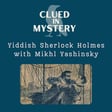
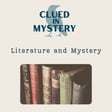
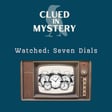
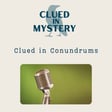
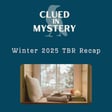
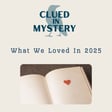
![[Re-release] Anthony Berkeley image](https://media.zencastr.com/cdn-cgi/image/width=112,quality=85/image-files/61e1c276e3ec42007857cff9/e7c778ac-a2ba-4809-9a5c-7cd39d167834.jpg)
![[Bonus] Wake Up Dead Man image](https://media.zencastr.com/cdn-cgi/image/width=112,quality=85/image-files/61e1c276e3ec42007857cff9/e276ac32-e664-464f-956c-7699bdb60aa5.jpg)
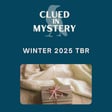
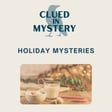
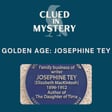
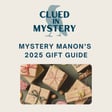
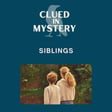

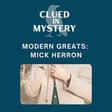
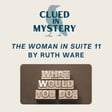
![[Bonus] Read Along: Daughter of Time image](https://media.zencastr.com/cdn-cgi/image/width=112,quality=85/image-files/61e1c276e3ec42007857cff9/b953ad72-c43e-48ca-a18a-b3c216ab90ee.jpg)
